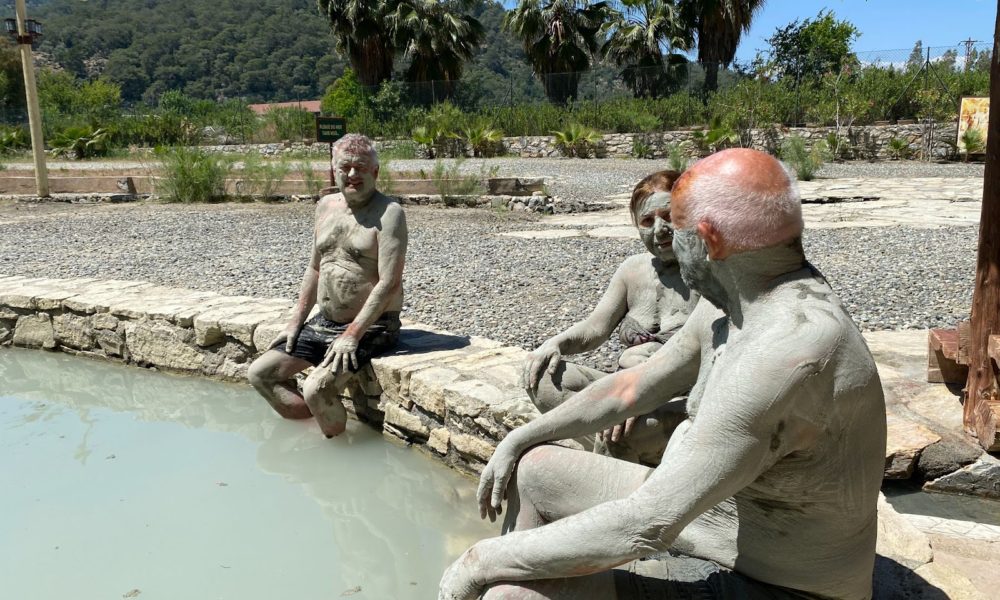
Excursion to swamp country
39° 45′ 38.4804” N 26° 8′ 42.2916” E
May 14, 2022
Dalyan
She teaches us to drink Turkish tea, pronounced “Chai,” drink thick Turkish coffee, and eat flimsy cheese rolls for lunch. Her name is Emel, she is Turkish, loves Cuban cigars and has for some years been married to Swiss Andreas, with whom she shares life and daily life in an apartment in Istanbul, a rural cottage in Germany and a sailboat in the Mediterranean. Both are retired.
Today we have gone with Emel and Andreas on a trip in the swamp. We have rented a riverboat, which takes us west to the long Iztuzu Beach, the turtle beach where turtles go to lay eggs. Here we find an opening in the beach, and sail into the delta of the Dalyan River, which winds through man-high reeds and slowly reveals an enormous marsh area.
The first stop will be the ruin town of Caunos, which has only yet been partially excavated, but which is interesting, while among the ruins of the theater, temple, bathhouse and towers we are joined by a huge herd of goats, a donkey, a turtle and a snake more than one and a half meter long.
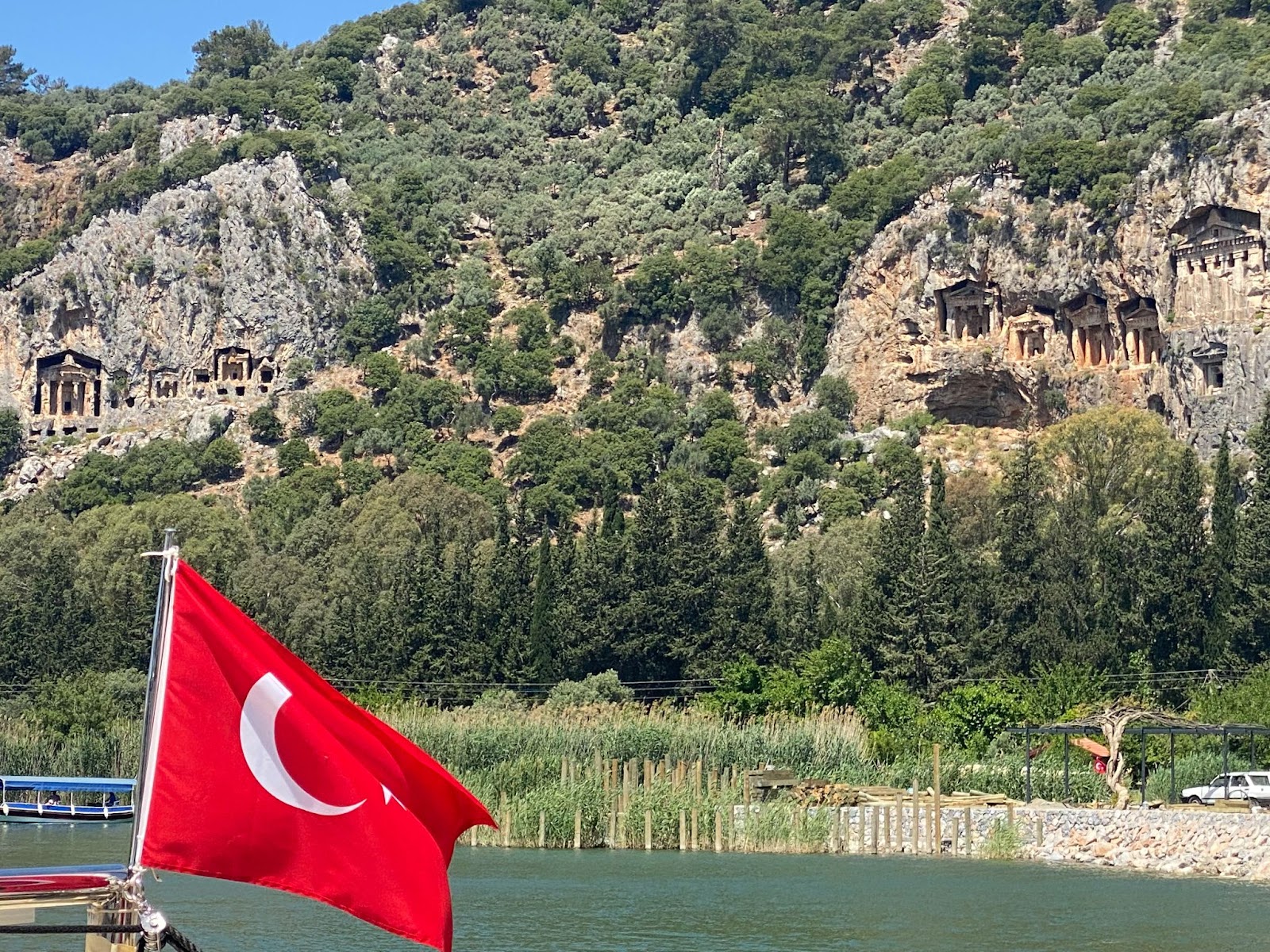
Later, we make a stop in the tourist town of Dalyan, which is especially known for its spectacular burial chambers carved into the mountainside high above the city.
Before the return trip, we visit the mud baths a little north of Dalyan and get the first mud bath of our lives. More special than actually nice
A super day. Most of all instructive because of Emel and Andreas, who generously pour out their Turkish knowledge.
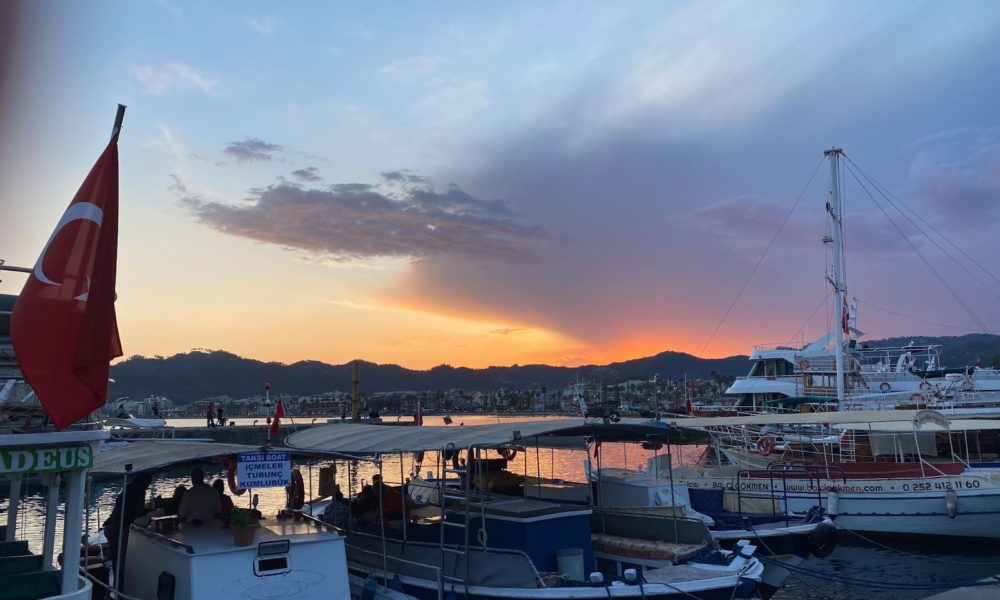
On the outskirts of a tourist Mecca
36° 51′ 17.766” N 28° 16′ 15.1608” E
Marmaris
We have set our course towards Marmaris, because after lying at anchor we need to have our anchor winch repaired, as it again and again causes troubles. But also, to experience a big city where Danish tourists some years ago filled a lot, but where the Turks today refer to Danes as a people who increasingly have been avoiding Turkey.
We find a berth in a large marina eight kilometers before Marmaris and it turns out to be a wise decision. Marmaris itself is an intense tourist mecca with a huge bazaar and kilometer after kilometer of quay with restaurants and tour boats.
The city was destroyed by an earthquake in 1958, so there are not many historic buildings. But for a sailor, Marmaris is an eldorado where you can buy whatever your heart desires for your boat. The city has a whole neighborhood of shops that only deal with boat equipment.
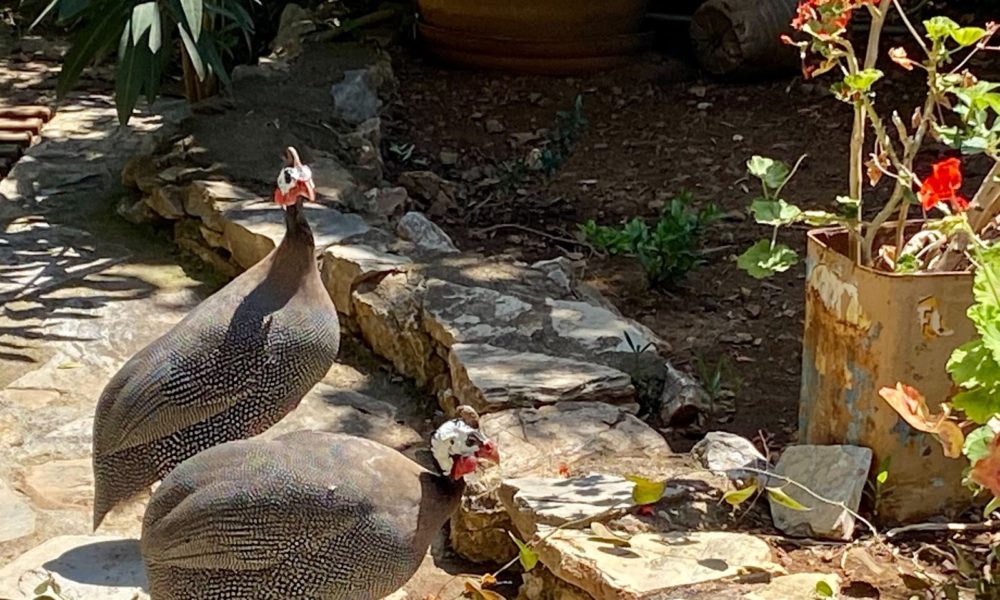
A hug for the future
36° 49′ 18.1992” N 28° 33′ 53.0964” E
May 11th, 2022
Ekincik Limani
Last night I (Kirsten) met a young girl who made an impression on me.
We had moored Ronja at a very small jetty in a Turkish bay far away from everything. Only four other boats at the jetty. A flock of guinea fowls strutted around, looking for food. I gave them some crumbs, which they greedily carved into themselves. A little girl and her young mother were very interested in the guinea fowls, so we fell into conversation.
The girl was from Ukraine, just 17 years old and her daughter two years old. I asked her if she had fled the war. The answer was no, she sailed around in a boat with her father and her boyfriend, also 17 years old. But, she continued quickly, she would rather be at home in Kyiv.
She was sure that the war would soon be over and that Ukraine would be the victor.
Once she got home, she would start university and study political science. She wanted to do so, because she wanted to make a difference in the development of the Ukraine of the future.
We talked at length about the future, about solidarity, about democracy, and after some time the girl asked if we should give each other a hug.
The next morning she had sailed on.
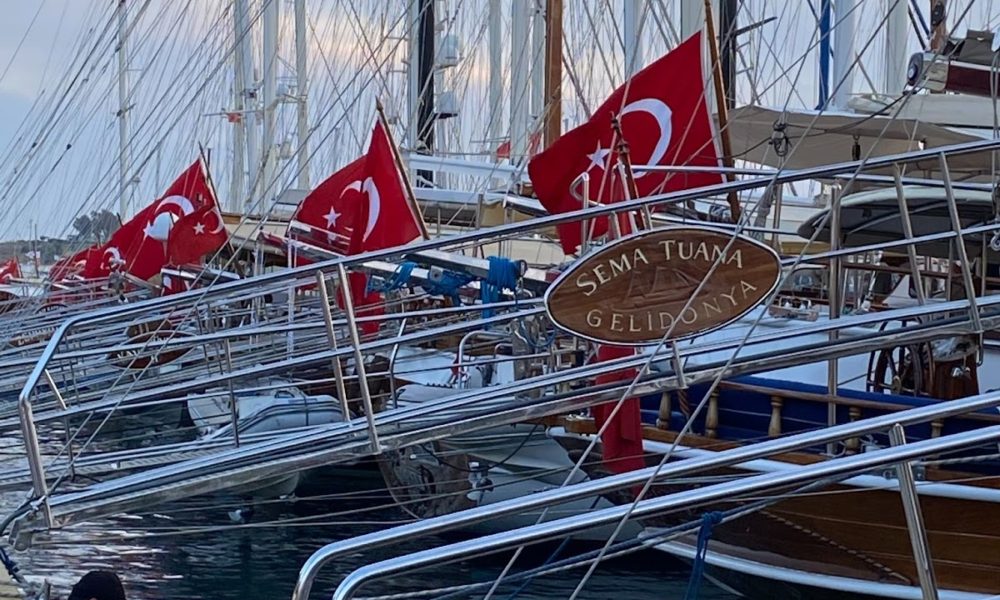
Chaotic arrival in Turkey
37° 2′ 3.8724” N 27° 25′ 49.944” E
May 10th 2022
Bodrum
Chaos. Our first meeting with Turkey is total chaos. The wind whips in through Bodrum harbour, where six or seven sailboats of different nationalities fight for two berths set aside for boats that have to check in with customs. Angry shouts and gestures. Long wait. Perhaps the bureaucracy is worse here than in Greece? Hard to imagine.
And yet, maybe. “Turkey is the worst country in the whole world to declare in,” states the captain of our neighboring boat. We ask him, where he comes from himself. “Turkey,” he replies. He has been with the family on a trip to Greece and now has to declare in his homeland.
Provided with the necessary stamps and on the way to our berth in the large marina, we notice the sounds. There’s really a lot of sound. Voices, music, children’s squeals, megaphones. And in the background, a muezzin fights his unequal battle to call to prayer from the speakers at the top of the minaret. There must be a traveling fairground in the city, we think. Later, we realize that there is no travelling funfair here. This IS the sound of Bodrum.
After a few days, we begin to draw comparisons between Greece and Turkey. The food is clearly better in Turkey. The nature is more lush, more trees on the mountains right down to the water. The Turks’ castles and historical ruins are more beautiful. The inhabitants are friendly and welcoming. On the other hand, they were also so in Greece.
And Erdogan? The president? He’ll be gone after next year’s election, people tell us. His latest economic plan is gasoline on the inflation bonfire. Officially, the government says the price of tomatoes and other foods has risen 75 percent in the past barely two years. “But we ordinary Turks know, that the price of tomatoes has risen 150 percent,” one Turkish woman said angrily.
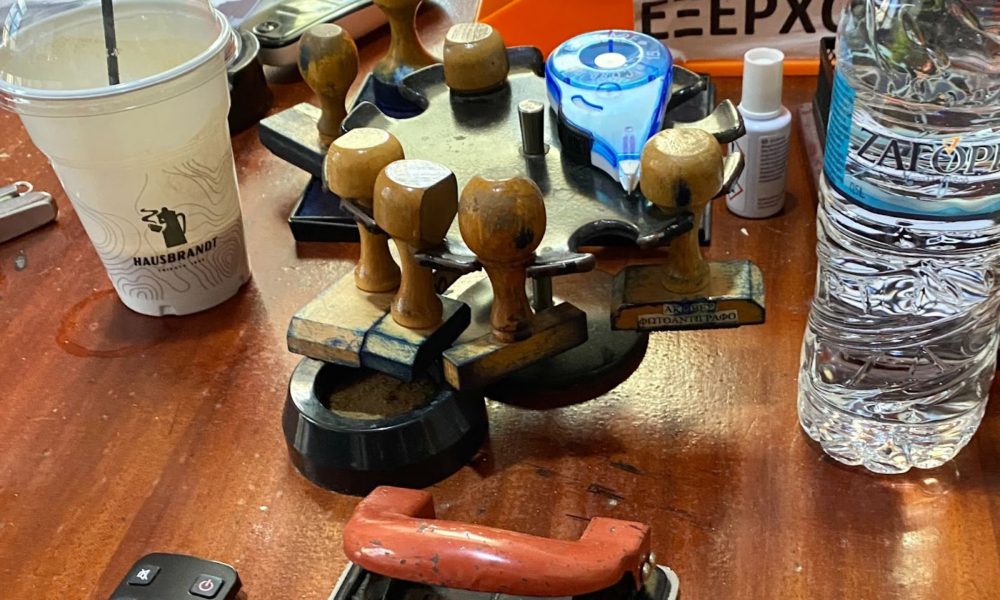
Goodbye Greece, Hello Turkey
37° 9′ 12.384” N 26° 51′ 24.48” E
May 5th, 2022
Leros
An adventure is over. A new one is about to begin.
After several years of wonderful sailing through Greece, we are on our way to Turkey.
The good ship, Ronja, has been launched into the water after six months of winter hibernation on the Greek island of Leros. We’ve been toiling for a few days to clean Ronja after a winter’s “red rain” – sand from the Sahara that blows across the Mediterranean, leaving a greasy layer of dust and sand over car, buildings and boats.
Safety equipment – powder extinguishers and emergency rockets – has been renewed, and we have received the necessary stamps and signatures that we can leave Greece to sail to Turkey.
We’re ready. For new adventures.
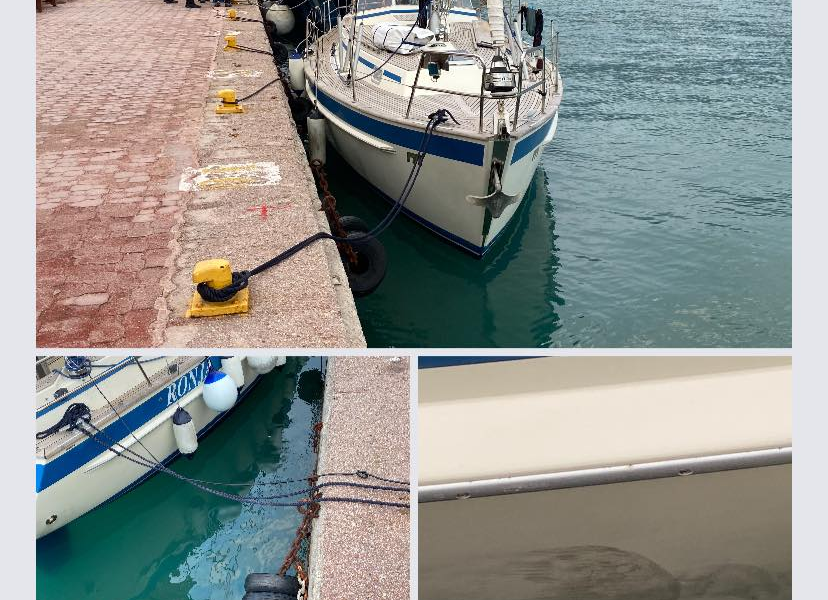
Please follow us to the police station!
38° 22′ 5.4588” N 26° 7′ 51.6216”
October 20th 2021<
In the skipper’s birthtown, Viborg, it was a standing joke among us children that the city’s best slot machine was the city’s police station. If you threw a stone in through a window, a policeman automatically came out of the gate.
This is also the case in Greece.
If you send a complaint to the Greek Ombudsman in Athens about an assault committed by the Greek Coast Guard on the island of Chios, a police officer will immediately stop by your boat and ask you to follow him to the police station.
The night before, we had emailed a complaint, that the crew of a vessel from the Greek Coast Guard had moved our sailboat without asking permission, having done so in such a lax way, that the moving has drawn marks on the side of our boat from rusty metal rings and old car tires and finally that they have fastened the boat in a way so sloppy, that it is sure to get additional damages. When we arrive – alerted by other sailors – we are furiously rejected. “This is Hellenic Police. Police business.” Their business is that they have laid their boat longship behind ours, and their power cable is too short to reach the power stand.
At the police station, a classic game with “bad cop” and “good cop” takes place.
The first two police officers go hard on us: “Why were you not in your boat, when a storm warning was issued?” The storm warning was valid from late in the evening, while the episode took place in the afternoon in sun and quiet weather. “It is the coast guard’s fixed place in case of storm warnings“, they continue. It is said nowhere on signs, and the harbor master has been at our boat to receive payment for space and electricity. “You must understand that when you complain about us, we also have to open a complaint against you.” No, we do not understand that.
Then another officer comes in. The good one. “Do you want coffee,” he asks and tells us that he is a fan of Danish football, Michael Laudrup and Peter Schmeicel. The mood eases.
Then comes the very head of the region’s Port Police in stiff and ironed, chalk-white uniform with two rows of medals on the shirt chest. He regrets our meeting with his people the previous day. Uses the word sorry. Still, he thinks our complaint is unfair. The crew we complain about are heroes. They rescue sick children from remote islands, and they have rescued thousands of refugees in small boats. “Why have you complained to Athens? Do you not know what such a case will mean of ministerial involvement and lots of negative attention? Why create an image of Chios as a bad place? We need tourists.”
We say that we have full respect for that kind of heroic effort. But even heroes need to behave properly in the meeting with citizens like us.
We discuss the situation at Ronja for a few days. Skipper’s wife has a big and forgiving heart, where skippers are more like a tough nut. The big heart wins. We write to the ombudsman, cancel the complaint and sail further south towards new adventures.
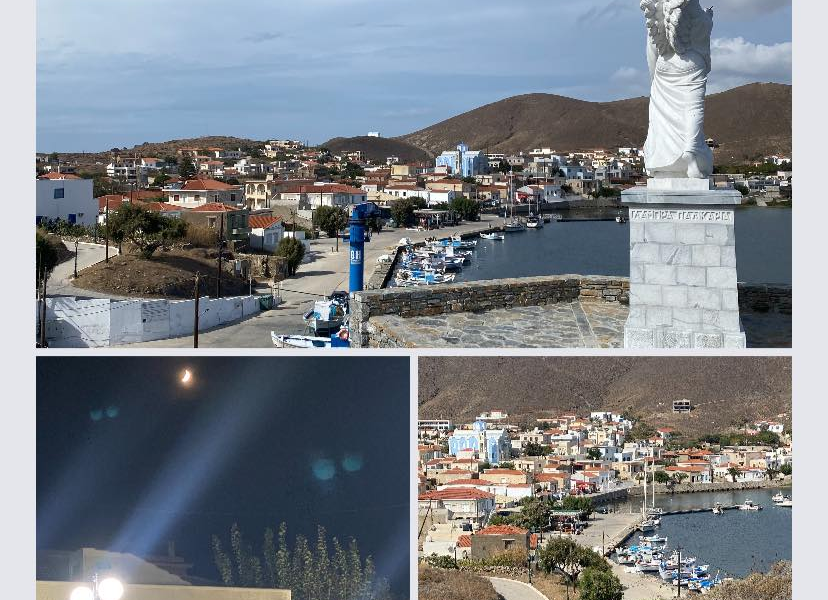
The miracle on Psará
38° 32′ 33.0396” N 25° 33′ 48.996” E
October 16th 2021
Where is Manoli?
On the Greek island of Psará, it is agreed that the retired sailor, Manoli, will be the best at solving our engine problem. The message spreads faster than a Facebook post, word of mouth, from neighbor to neighbor, among the island’s 400 inhabitants: Find Manoli!
The island of Psara is described as the most remote island in Greece. It takes between six and nine hours to get to and from the island with a daily ferry depending on how many stops the ferry makes along the way. One-day tourists do not exist. We are two foreign sailboats in the harbor.
After a day of ten hours sailing in high waves and wind directly against us, we have had engine problems. During the last two hours of sailing, the engine loses speed again and again, and only with the help of sails at the closest possible angle do we reach port. Skipper’s wife’s heart beats so high, we can barely concentrate on holding the course.
There is no mechanic on the island. So we start the morning by asking a couple of fishermen and some local people at the harbor café: “Do you know anyone who can help us with an engine problem?” And then things moves fast. During the day, we constantly bump into people who say, “Well, it’s you with the filter problem. You must find Manoli. ”
The next morning, Manoli is standing on the dock with his younger friend Andrea, and they throw themselves over the engine, open fuel filters, turn off fuel pipes to see if there is free flow, listen to the engine at various revs, discuss loudly in Greek and ask questions to us about the quality of our diesel, about the height of the diesel in the tank, and whether we have been out in raw weather.
After two hours, they make the diagnosis: Some filth has settled on a small filter in the booster, because we have been sailing in raw weather with low level in the diesel tank. Some dirt at the bottom of the tank has swirled up and is now sitting in the booster filter.
Fill up the tank, sail to the larger island, Chios, have a mechanic disassemble the booster and insert a new filter. We nod and ask how much we owe. “Nothing,” they both say. “We did not solve your problem”.
Maybe they did anyway. As we next day sail the 40 nautical miles to Chios town in high seas, we have no problems with the engine.
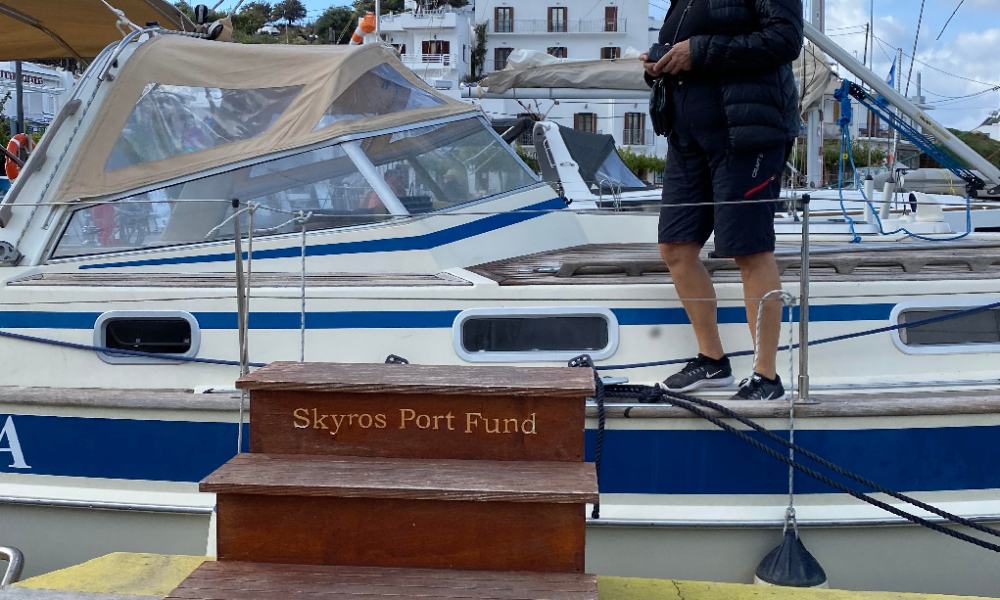
Small harbor with a huge format
38° 50′ 17.3472” N 24° 33′ 12.6972” E
October 11th 2021
Have you tried to call at Linaria on the Greek island of Skyros? You should try.
Every evening at 20.30 a large ferry slides into its berth and announces with a roar from its ship’s horn, that it has arrived. Immediately afterwards, the tones of Richard Strauss’ Also sprach Zarathustra, is heard with as loud a sound as the ferry, answered from shore from loudspeakers placed on a mountainside.
This is how it has sounded every night for 20 years. The ferry is honking, the city is welcoming. With pompous, loud music. Like it was a lunar landing directed by Stanley Kubrick.
The citizens of Skyros are proud of their ferry. “We bought it ourselves,” says one Greek. “We all pay for it. Without a daily connection to the mainland, our island cannot function.”
Linaria is a very small port with room for just 12 guest boats, but we feel more welcome than usual. The harbor master sails to meet us, attaches his rubber boat to our bow and drags us safely to the quay, where he gives us a Danish-language guide to the harbor, tells about the harbor’s book exchange scheme and about washing machine, dryer and “disco shower”, where you can listen to Greek pop music around the clock while showering in cold water.
A port does not have to be large to have format.
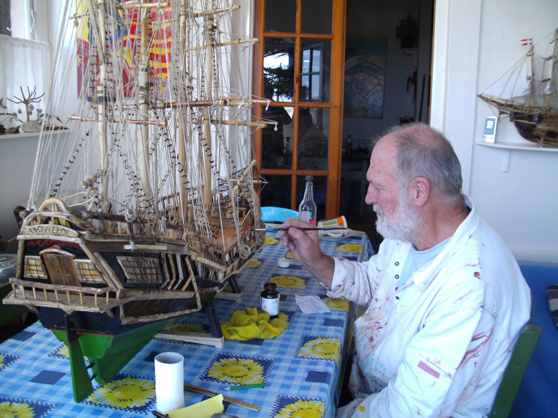
Think twice before you get married to a Greek man
39° 9′ 23.724” N 23° 52′ 58.9836” E October 9th 2021 Jerk, noise and violent tilting. Our good ship, Ronja, is tearing at its moorings, while a wind from the northeast blows strong swells into the port of Alonissos. We do not get an eye closed all night. The next morning we move on. This port has too little shelter, when the wind is in the northeast. Too bad. Alonissos seems like a charming island with beautiful nature and a declared goal of becoming Greece’s greenest island. We manage to visit a Danish couple, Mona and Jørgen, who live on Alonissos and have done so for 15 years. Jørgen builds viking ships, fishing boats, merchant ships, warships and entire landscapes from materials, he finds along the beach. Equipped with saws and surgical knives, he creates one masterpiece after another. Impressively beautiful, they hang on the terrace and on every single wall and shelf in their small villa. Under the beds are a few hundred more works. Mona and Jørgen make up half of the permanent Danes on Alonissos. The other two are women. Both divorced. Mona’s conclusion: “Be careful with Greek men. They can be good as boyfriends. But think twice before you marry them, because then you will have their entire Greek family with you. ”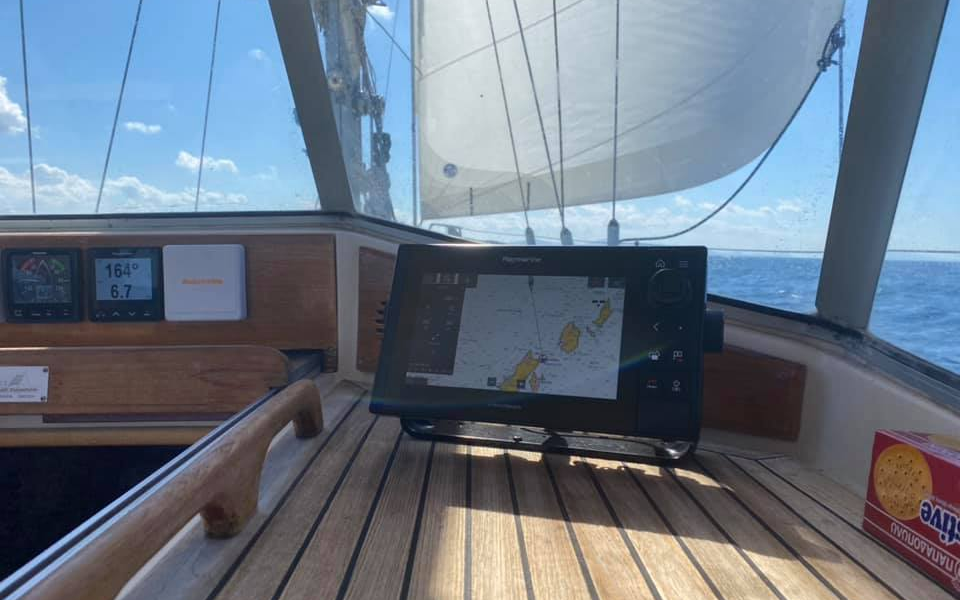
New toys onboard S/Y Ronja
39° 56′ 44.6424” N 23° 42′ 15.372” E
October 5th 2021
Land ahead! The good ship Ronja is on the move again. This time we follow a route through the Aegean Sea from Thessaloniki in the north to Leros in the south with detours to the Chalkidiki Peninsula, the islands of Alonissos, Skyros, Psará, Chios and many others. In Thessaloniki, we have replaced our 24-year-old and no longer completely sane navigation system with a brand new Raymarine Axiom – this is how toys and safety can go beautifully hand in hand. At the same time, we have had a diver down to scrub Ronja’s bottom free of the worst vegetation after a completely unusually hot summer. We are ready for new adventures.